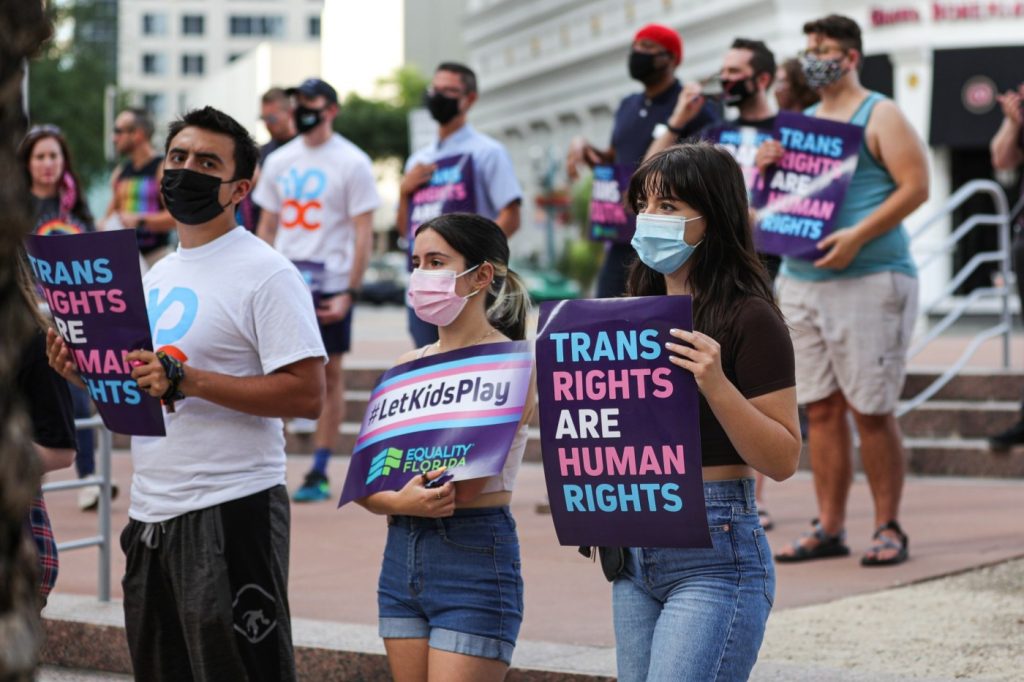Some of Florida’s restrictions on medical care for transgender children and adults are unconstitutional and unjustified, a federal judge ruled on Tuesday in a lawsuit brought by transgender Floridians and their families against the state.
“Transgender opponents are of course free to hold their beliefs. But they are not free to discriminate against transgender individuals just for being transgender,” U.S. District Judge Robert Hinkle’s decision read.
This ruling in Doe v. Ladapo prohibits enforcement of some parts of a 2023 Florida law that added several restrictions to adults receiving cross-sex hormone therapy and blocked puberty blockers and hormone therapy for teenagers under 18. The suit was brought by several parents of children whose gender identity did not align with their biological sex, as well as a transgender man.
The law was passed by the Republican-dominated Legislature and signed by Gov. Ron DeSantis.
DeSantis spokesperson Julia Friedland said that the state will appeal this ruling.
“Through their elected representatives, the people of Florida acted to protect children in this state, and the Court was wrong to override their wishes. We disagree with the Court’s erroneous rulings on the law, on the facts, and on the science,” Friedland wrote in an email.
The judge wrote that the law showed “bias of the kind sometimes directed at racial or ethnic minorities or women but also a belief that transgenders should not exist at all—or should not be allowed to pursue their transgender identities.”
He called out discriminatory language used by legislators such as Rep. Webster Barnaby, R-Deltona, who called transgender people “mutants” and “demons” at a committee hearing for a related bill.
One of the plaintiffs in the case said the ruling was good news for her child.
“This ruling means I won’t have to watch my daughter needlessly suffer because I can’t get her the care she needs. Seeing Susan’s fear about this ban has been one of the hardest experiences we’ve endured as parents. All we’ve wanted is to take that fear away and help her continue to be the happy, confident child she is now,” said one of the plaintiffs in a statement. She stayed anonymous in order to protect her and her child’s privacy.
Her daughter, referred to as Susan Doe, was “living fully as a girl” since kindergarten but had not started taking medical treatment because she hadn’t reached puberty.
The treatments at issue in this case were puberty blockers and cross-sex hormones.
Related Articles
Nearly 80% of Americans are concerned about the spread of ‘disinformation’ — with Black people among the most targeted
Taylor Swift once made it very clear to Trump why she ‘doesn’t like’ him
Ohio vacancy, challenges to S.C. Republicans Timmons and Mace top Tuesday’s races
What to know ahead of Tuesday’s Nevada primary
‘This will not be 1968.’ Chicago police prepare for DNC as whole world watches once again.
Puberty blockers are a reversible way to delay puberty for teens who are struggling with their gender identity. Cross-sex hormone therapy is a partially-reversible process — depending on how long hormones have been taken — where people are given estrogen or testosterone in order to develop characteristics of their preferred gender identity.
The judge ruled that clinical evidence supports this treatment as a reasonable option.
“The record includes no evidence that these treatments have caused substantial adverse clinical results in properly screened and treated patients— patients who were screened and treated with appropriate caution in compliance with the Endocrine Society and WPATH [World Professional Association for Transgender Health] standards of care,” the ruling reads.
DeSantis and other politicians brought up extreme and irrelevant surgical procedures when discussing this ban — arguing children were being “castrated” or “mutilated,” he added.
“At least insofar as has been shown by this record, no transgender minor has ever been castrated or intentionally sterilized in Florida or elsewhere. But without any factual basis whatsoever, individuals who had a role in adoption of this legislation repeatedly asserted the contrary,” the judge wrote.
The governor’s office used similar language in its response to the judge’s ruling.
“As we’ve seen here in Florida, the United Kingdom, and across Europe, there is no quality evidence to support the chemical and physical mutilation of children,” Friedland wrote. “These procedures do permanent, life-altering damage to children, and history will look back on this fad in horror.”
Florida’s 2023 law also added several restrictions to adults receiving this care — the first state to do so — including a requirement that adults must be prescribed care by a physician rather than professionals like nurse practitioners that operate under the supervision of physicians.
In a state with a physician shortage, this made it difficult for some to get care at all. Several clinics stopped providing gender-affirming care altogether in response to this law, the Associated Press reported.
“I’m so relieved the court saw there is no medical basis for this law—it was passed just to target transgender people like me and try to push us out of Florida,” said Lucien Hamel, a transgender man and one of the plaintiffs, in a statement. “This is my home. I’ve lived here my entire life. This is my son’s home. I can’t just uproot my family and move across the country. The state has no place interfering in people’s private medical decisions, and I’m relieved that I can once again get the healthcare that I need here in Florida.”
Florida’s restrictions contradicted widely accepted and long-standing guidance published by the American Academy of Pediatrics; the Endocrine Society, a global medical organization; and the World Professional Association for Transgender Health, an international group focused on gender dysphoria treatment.


